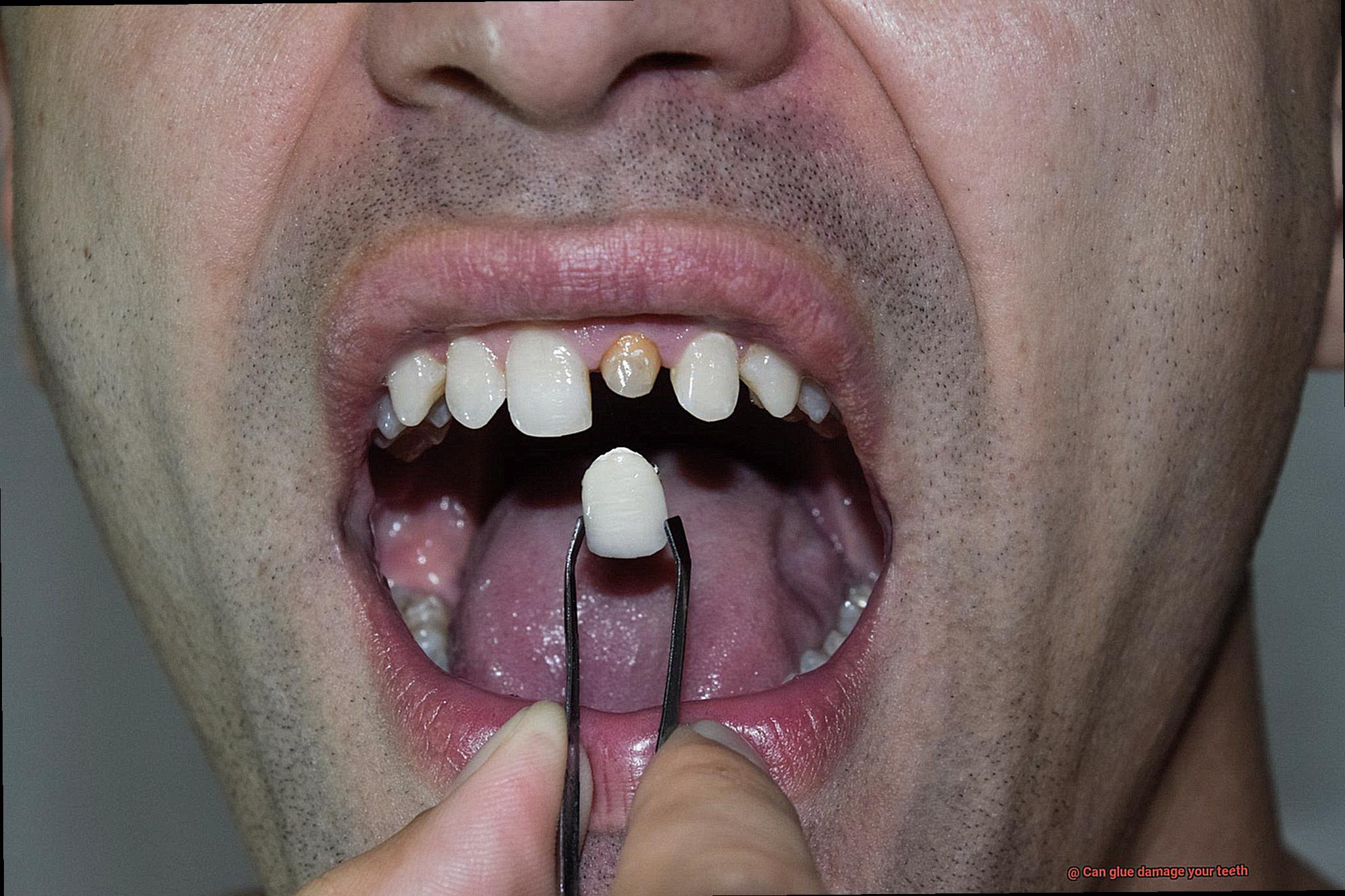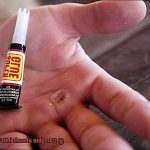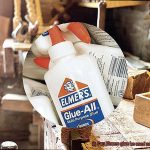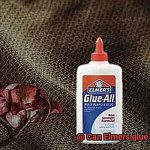Ever found yourself in a sticky situation, desperately contemplating using glue as a makeshift dental fix? Picture this: a loose dental crown or a temporary filling that’s on the verge of falling out, leaving you in a panic until your next dentist appointment. It’s tempting to reach for that trusty tube of adhesive, but before you do, it’s time to pause and ponder the potential consequences.
In this blog post, we’re delving deep into the sticky matter at hand to uncover whether glue can truly wreak havoc on your teeth. Prepare for an eye-opening exploration as we separate fact from fiction, debunk myths, and arm you with vital insights to safeguard your oral health.
So, let’s brush away any doubts and embark on this journey together— because when it comes to glue on your teeth, it’s crucial to know what’s really sticking around.
Types of Glue
Contents
Glue is a versatile tool that can help us mend, create, and innovate. However, when it comes to our teeth, not all glues are created equal. In this essay, we will explore the different types of glue and their potential effects on dental health.
School Glue: Innocent in Small Doses
School glue, also known as white glue or PVA glue, is commonly used in arts and crafts projects. This water-based glue is non-toxic and safe for children. In small amounts, accidental ingestion of school glue is unlikely to cause harm to teeth. However, it is still best to avoid swallowing or chewing on this glue.
Super Glue: A Powerful Adhesive, A Dental Enemy
Super glue, or cyanoacrylate adhesive, is a fast-drying and strong adhesive used for bonding materials like metal and plastic. While super glue is not meant for oral use, accidental exposure can occur when using it as a temporary fix for dental appliances or braces. Applying super glue directly to teeth can cause severe irritation and damage.
Dental Adhesive: Keeping Smiles Intact
Dental adhesive, also known as dental cement or denture adhesive, is specifically designed for oral use. It is used to secure dental prosthetics like dentures and bridges. Dental adhesives are safe for teeth when used as directed by dental professionals. They provide a strong bond while being easily removable without harming natural teeth.
Epoxy Resin: Versatile but Cautionary
Epoxy resin is a multipurpose adhesive used in crafts, woodworking, and even dental repairs. While epoxy resin itself is not harmful to teeth, the hardening process often involves chemicals that can be toxic if ingested. It is crucial to follow instructions carefully and avoid contact between uncured epoxy resin and oral tissues.
Household Glue: Harmful Chemicals, Dental Danger
Household glues, such as wood glue or construction adhesive, are not intended for oral use. These glues contain strong chemicals and solvents that can be harmful if ingested. Exposure to household glue should be avoided, and immediate medical attention sought if ingestion occurs.
Conclusion:
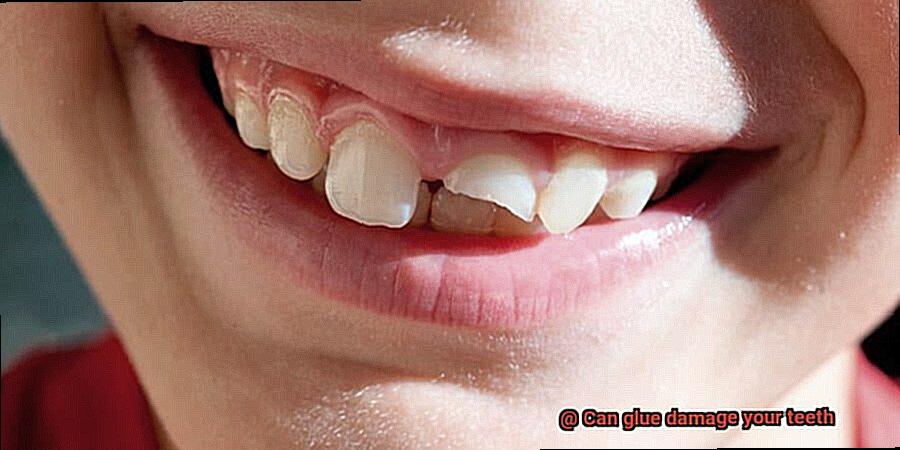
When it comes to glue and teeth, caution is key. School glue and dental adhesives are generally safe for oral use, while super glue, epoxy resin, and household glues should be kept away from teeth and gums. It is always best to consult dental professionals for guidance on appropriate dental adhesives and oral care practices.
Dental Glue
A dazzling smile is something we all desire, and dental glue is a vital component in achieving and maintaining that perfect smile. However, it’s essential to be well-informed about the benefits and potential risks associated with dental glue. Let’s delve into the world of dental adhesives to ensure you’re armed with the necessary knowledge for your oral health journey.
The Benefits of Dental Glue:
- Stability: Dental glue provides an unyielding bond between dental restorations and natural teeth, guaranteeing stability and long-lasting results.
- Chewing Power: With the help of dental glue, you can confidently indulge in your favorite foods without fear of loosened or dislodged restorations.
- Aesthetics: Dental glue seamlessly blends restorations with your natural teeth, creating a flawless appearance.
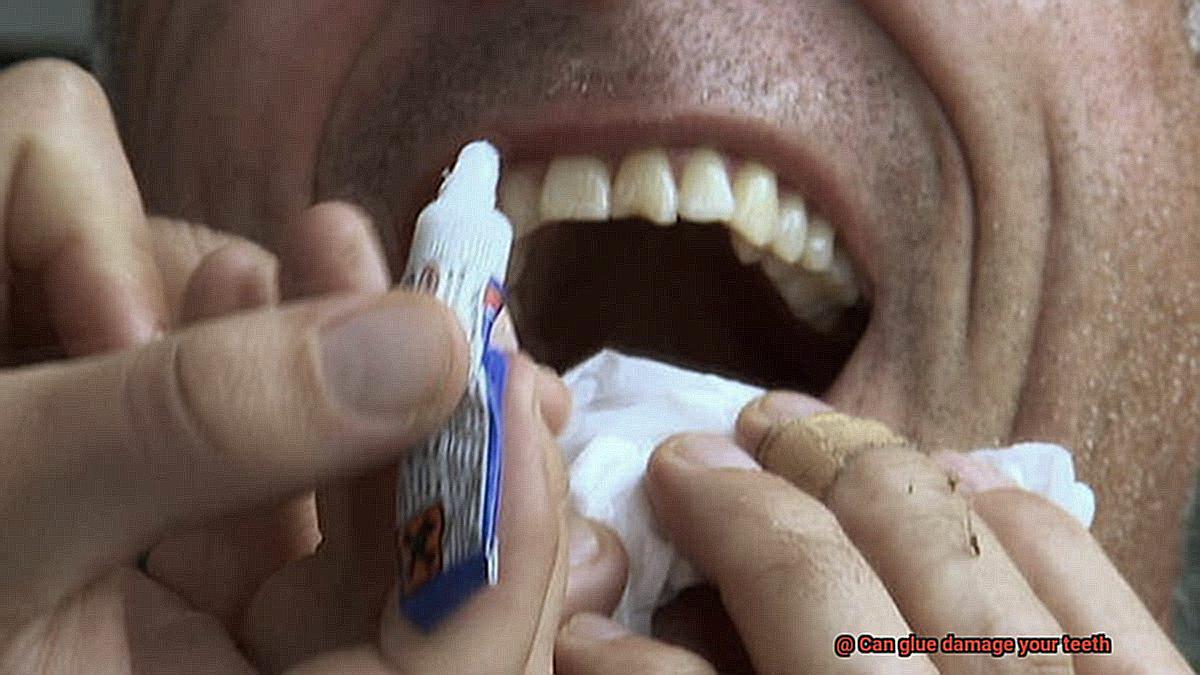
Allergic Reactions:
- Sensitivity: Some individuals may experience gum irritation or swelling due to allergies to certain components in dental glue. If you encounter any discomfort, it’s crucial to promptly consult your dentist.
- Compatibility: Inform your dentist about any allergies or sensitivities you have to avoid potential adverse reactions.
Proper Application and Misuse:
- Follow Instructions: Always adhere to your dentist’s instructions when applying dental glue. Applying excessive adhesive or using it on unhealthy tooth surfaces can result in an ill-fitting restoration and subsequent complications.
- Temporary Solution: Remember that dental glue is not a long-term fix for broken or damaged teeth. Seek professional evaluation and treatment options for underlying dental issues.
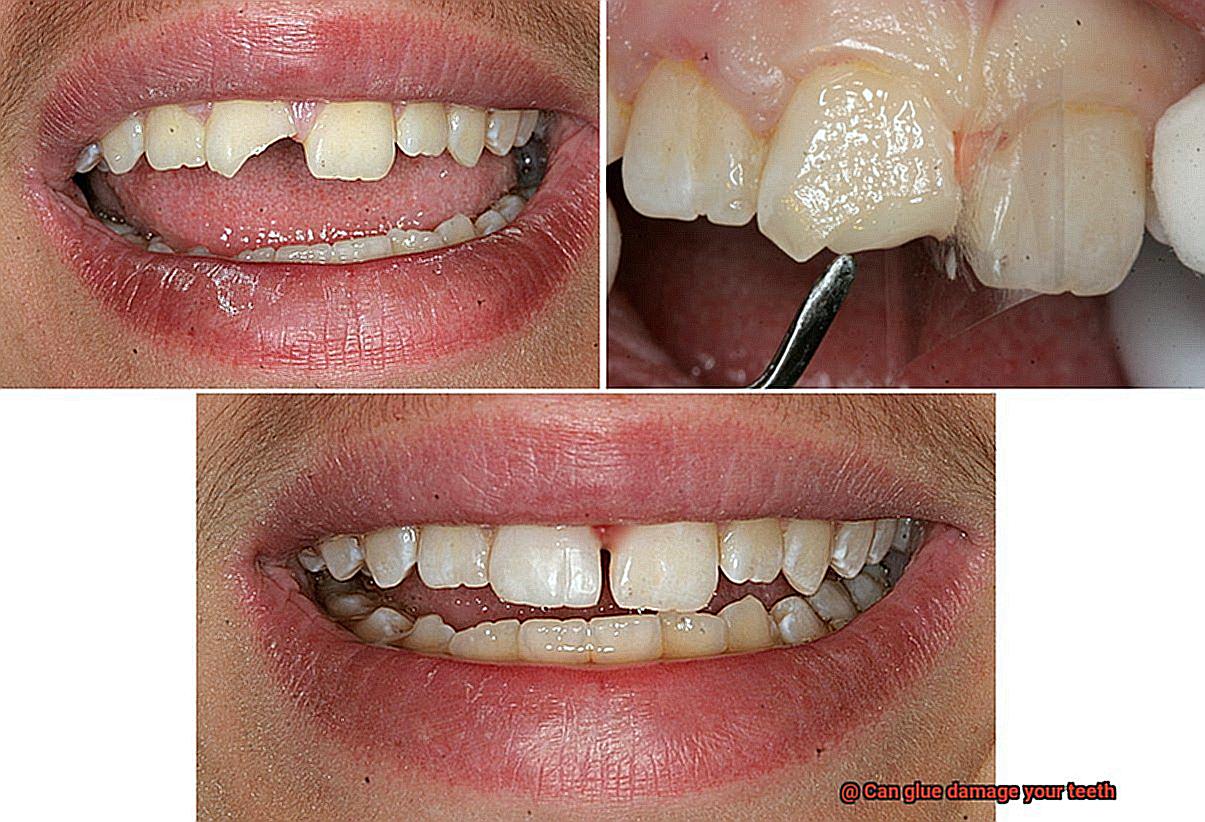
Seeking Professional Guidance:
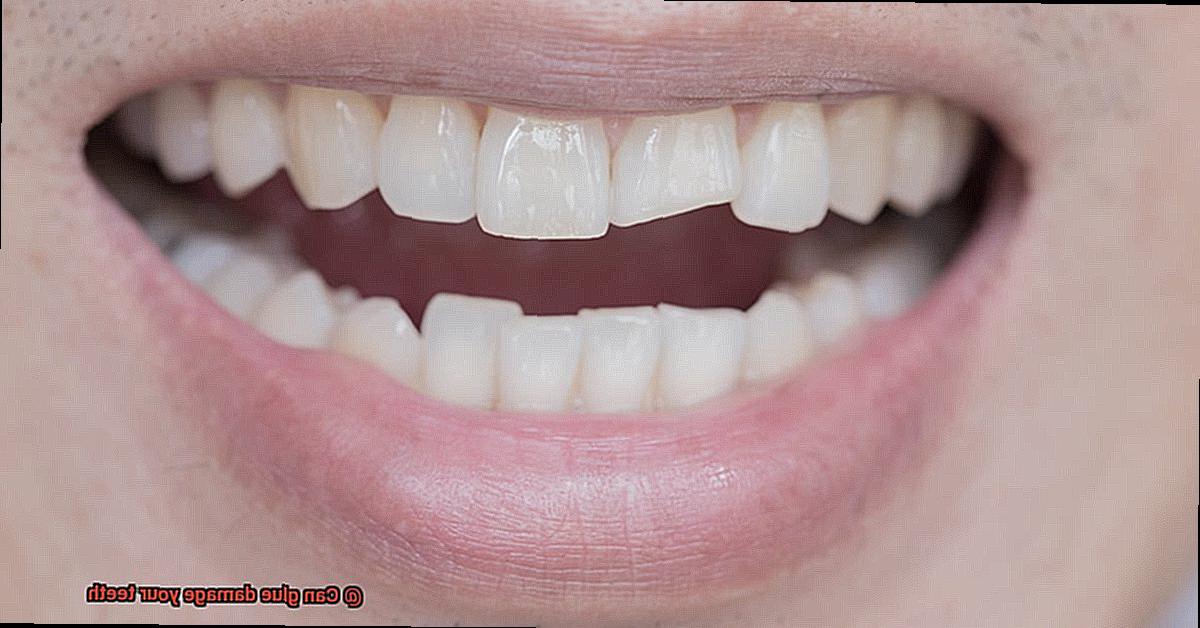
- Dentist’s Expertise: Relying on a professional dentist for guidance ensures the proper use of dental glue while taking into account any specific concerns or conditions you may have.
- Regular Check-ups: Schedule routine dental visits to assess the condition of your restorations and address any potential issues early on.
Non-Dental Glues
We’ve all been there – dealing with a loose crown or a broken denture can be quite the hassle. But before you grab that super glue lying around the house, let’s explore the potential risks of using non-dental glues on your precious pearly whites. Trust me, your teeth deserve better.
Toxicity Trouble:
Let’s start with the issue of toxicity. Non-dental glues, such as super glue, contain chemicals that can be harmful if ingested or come into contact with your oral tissues. Picture this – do you really want your mouth to turn into a chemical party zone? I didn’t think so.
Sensitive Smiles:
For those of you lucky enough to have sensitive oral tissues, non-dental glues can spell disaster. These glues often contain substances that can cause irritation, burning sensations, and even allergic reactions. Nobody wants a mouth that feels like it’s breathing fire, right?
Durability Dilemma:
Sure, non-dental glues might provide a quick fix for your dental problems, but when it comes to long-term durability, they simply don’t make the cut. These glues weren’t designed to withstand the daily grind of chewing and speaking. So while you may feel like a dental MacGyver fixing your own issues with super glue, you could end up doing more harm than good in the long run.
The Dentist’s Prescription:
It’s simple – consult a dental professional. Dentists have access to adhesives specifically designed for dental use that are safe and effective for your mouth. They possess the expertise to assess your unique situation, recommend appropriate treatments, and guide you on proper maintenance to ensure the longevity of any dental restorations. Remember, they’re experts for a reason.
Potential Risks of Using Non-Dental Glues on Teeth
In the quest for a quick fix to dental issues, many people are tempted to turn to non-dental glues as a solution. But before you reach for that bottle of craft glue or tube of super glue, it’s important to understand the potential risks involved. Your teeth deserve better than these makeshift fixes that can do more harm than good.
Chemical Burns and Irritation:
Imagine the pain and discomfort that can follow applying non-dental glues to your teeth. These adhesives are not formulated for oral use, which means they may contain harmful chemicals or toxins that can cause serious irritation or even chemical burns in your mouth. We’re talking redness, inflammation, and soreness that can make even the toughest among us cringe.
Allergic Reactions:
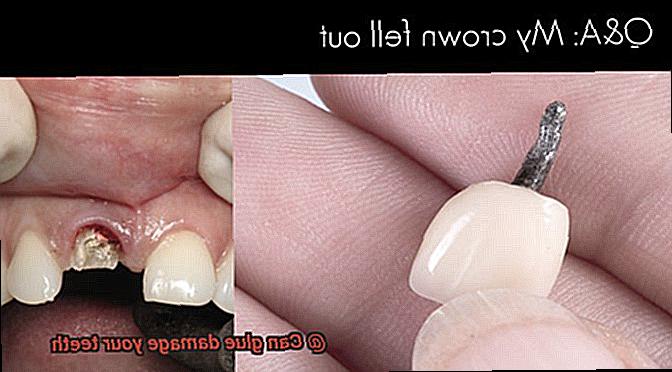
Just like unexpected allergies, non-dental glues can trigger allergic reactions in some individuals. Applying these adhesives to your teeth can lead to swelling, itching, or even difficulty breathing. Trust me when I say that a DIY dental fix isn’t worth an emergency trip to the hospital. Let’s keep the glue where it belongs – in the craft drawer.
Enamel Erosion:
Your tooth enamel is like armor protecting your teeth from decay and sensitivity. Unfortunately, using non-dental glues on your teeth can erode or weaken this vital layer of protection. The chemicals in these adhesives can leave your teeth vulnerable to cavities and other dental problems. Don’t let a temporary fix cause long-term damage to your pearly whites.
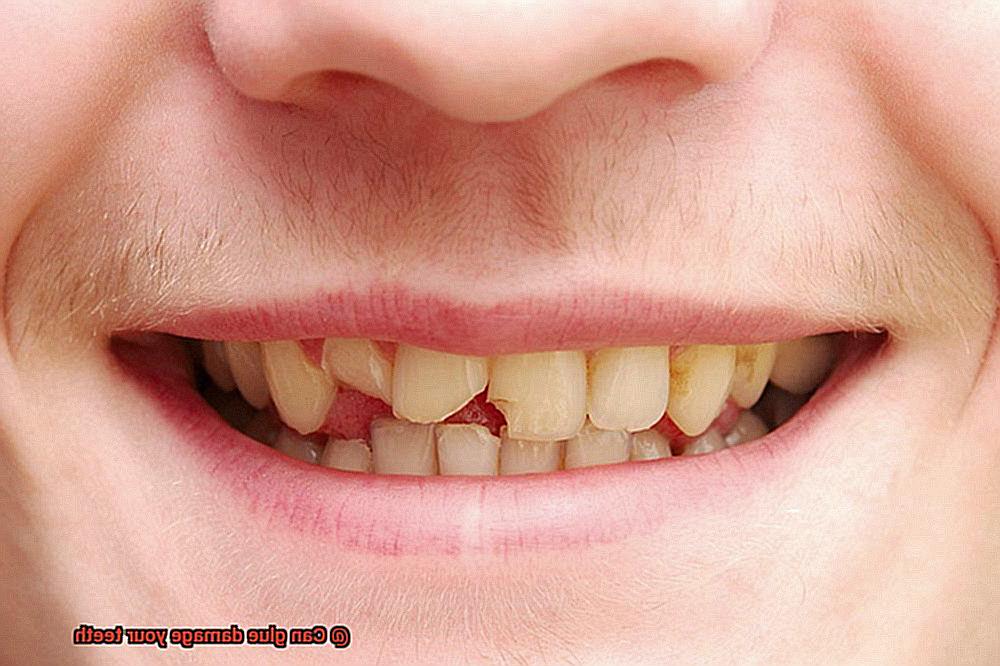
Compromised Dental Work:
If you’ve had dental work done, such as fillings or crowns, using non-dental glue on those areas could compromise the integrity of the dental work itself. Now imagine the hassle of more trips to the dentist and potentially costly complications down the road. Let’s avoid that altogether, shall we?
Short-Term Fix, Long-Term Problems:
Non-dental glues may provide a temporary fix, but they are simply not designed to withstand the forces and pressures of chewing and biting. Your teeth deserve professional care and attention, not a makeshift solution that can cause more damage or require additional dental treatment in the long run. Remember, shortcuts rarely lead to lasting success.
Chemical Erosion from Non-Dental Glues
We’ve all been there – a broken denture, a loose crown, or a chipped tooth. In our rush to fix the problem quickly, we might be tempted to reach for the nearest glue. But before you grab that tube of non-dental glue, let’s dive into the potential damage it can cause and how to prevent it.
The Culprit: Cyanoacrylate Glue:
One common type of glue that can wreak havoc on your teeth is cyanoacrylate glue, also known as super glue. This powerful adhesive may be fantastic for mending broken objects, but it was never designed for oral use. Keep it far away from your mouth.
Chemical Erosion:
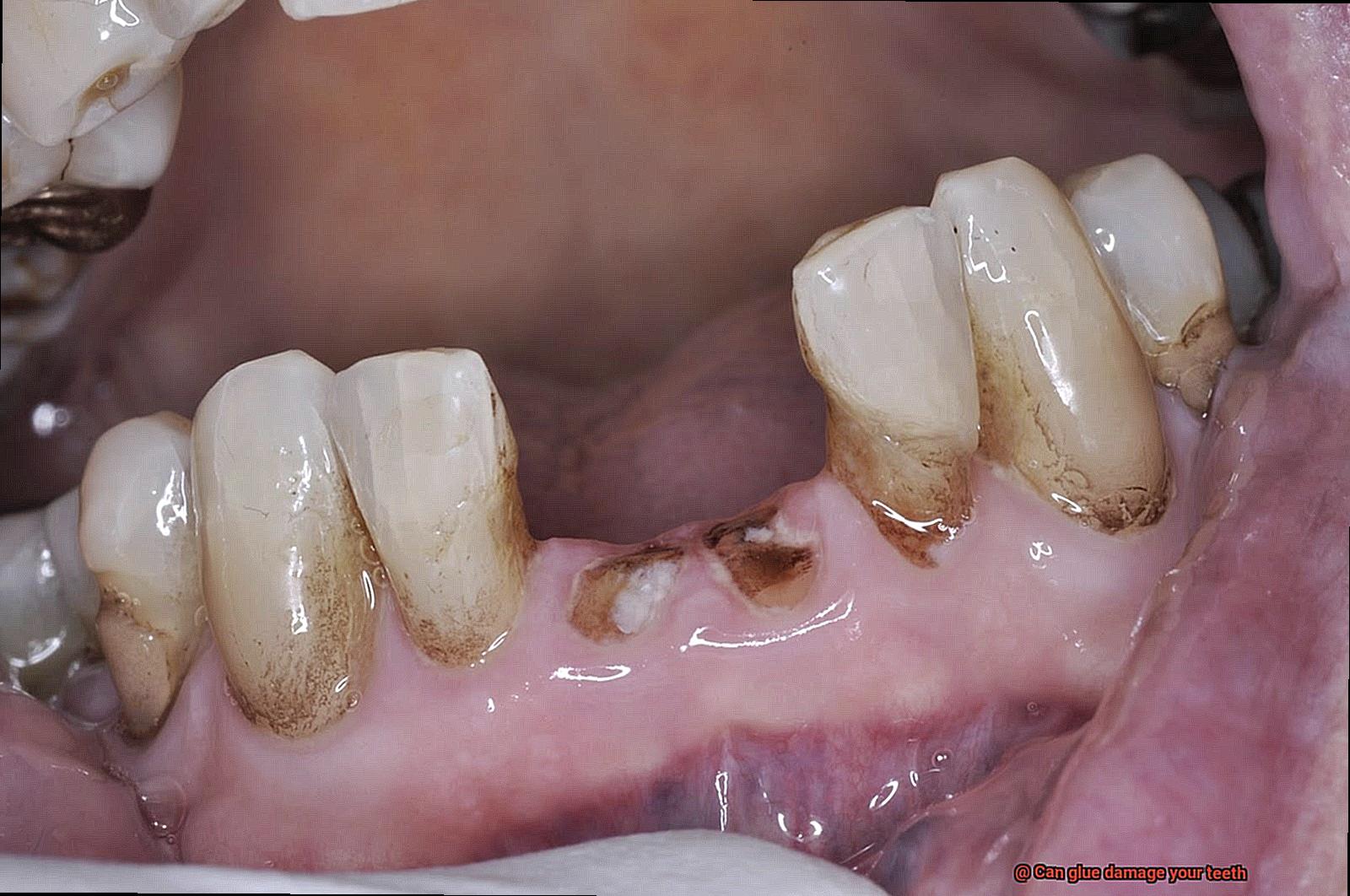
Non-dental glues often contain harmful chemicals that can gradually erode your enamel, leaving your teeth vulnerable to decay and sensitivity. These glues may also have acidic properties that weaken your enamel, making it more susceptible to damage.
Prevention is Key:
To prevent chemical erosion from non-dental glues, stick to using dental-approved adhesives for any oral-related applications. Dental glues are specifically formulated to be safe for your mouth and do not contain harmful chemicals.
Immediate Removal:
Accidentally got glue on your teeth? Act fast. Leaving the glue on your teeth for too long increases the likelihood of chemical erosion and other dental complications. Remove it immediately and rinse your mouth thoroughly.
Read and Follow Instructions:
When using dental adhesive products, always read and follow the instructions provided. This ensures proper usage and minimizes the risk of any adverse effects on your oral health.
Toxic Substances in Non-Dental Glues
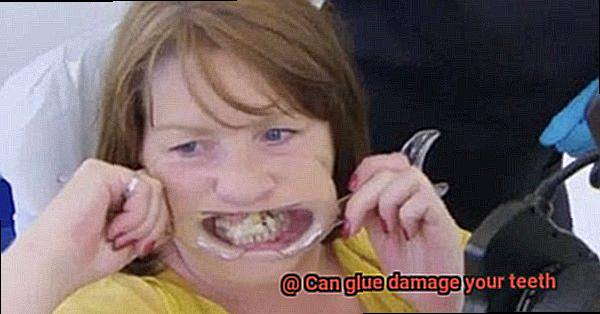
Non-dental glues may seem like a quick fix for a dental mishap, but before you reach for that tube sitting in your drawer, it’s crucial to understand the potential risks involved. These glues, such as super glue or household adhesives, are not meant for oral use and often contain toxic substances that can wreak havoc on your teeth and overall oral health. Let’s delve into the nitty-gritty details to give you a better grasp of the dangers at hand.
One of the primary concerns with non-dental glues is the presence of toxic substances. These can vary depending on the brand and type of glue, but some common offenders include formaldehyde, toluene, and acetone. Formaldehyde, a known carcinogen, can cause irritation and damage to the soft tissues in your mouth. Prolonged exposure to this toxic chemical can even lead to long-term health issues.
Toluene, another common ingredient found in glues, is a solvent that can bring about irritation and burning sensations in your mouth. It doesn’t stop there – toluene can also wreak havoc on your tooth enamel and gum tissues. And let’s not forget about acetone, yet another solvent. Highly volatile in nature, acetone can leave your mouth feeling dry and sensitive, damaging your oral tissues in the process.
When non-dental glues come into direct contact with your teeth, they weaken your tooth enamel, making it more susceptible to tooth decay and cavities. But the dangers don’t end there – ingesting these glues can have harmful effects on your overall health as well. Digestive issues, poisoning, and other systemic complications can arise from swallowing these toxic substances.
To avoid any potential harm from non-dental glues, it’s best to stick to dental-specific adhesives recommended by dentists or orthodontists for any dental-related procedures or treatments. These products are specially formulated to be safe for use in your mouth and won’t pose any risks to your oral health.
However, accidents happen, and if you accidentally ingest or come into contact with non-dental glues, it’s crucial to seek immediate medical or dental attention. Professionals will be able to provide you with the proper evaluation and treatment needed to minimize any potential harm.
Alternatives to Non-Dental Glue for Dental Issues
Picture this: you’re going about your day when suddenly a dental emergency strikes, leaving you in desperate need of a quick fix until you can see a dentist. While non-dental glue may seem like a convenient solution, it’s crucial to understand the potential risks involved. In this article, we’ll delve into why using non-dental glue for dental issues can be harmful and explore some temporary alternatives that can provide relief until you can seek professional help.
The Dangers of Non-Dental Glue:
- Toxicity: Non-dental glues often contain chemicals that release harmful vapors, posing risks to our overall health when inhaled or ingested. The last thing you want is to trade one dental problem for a whole host of health issues.
- Dissolving Effect: These glues are not designed to withstand the harsh environment inside the mouth. Exposure to saliva and oral bacteria can cause them to deteriorate quickly, leaving you with ineffective results and potential complications.
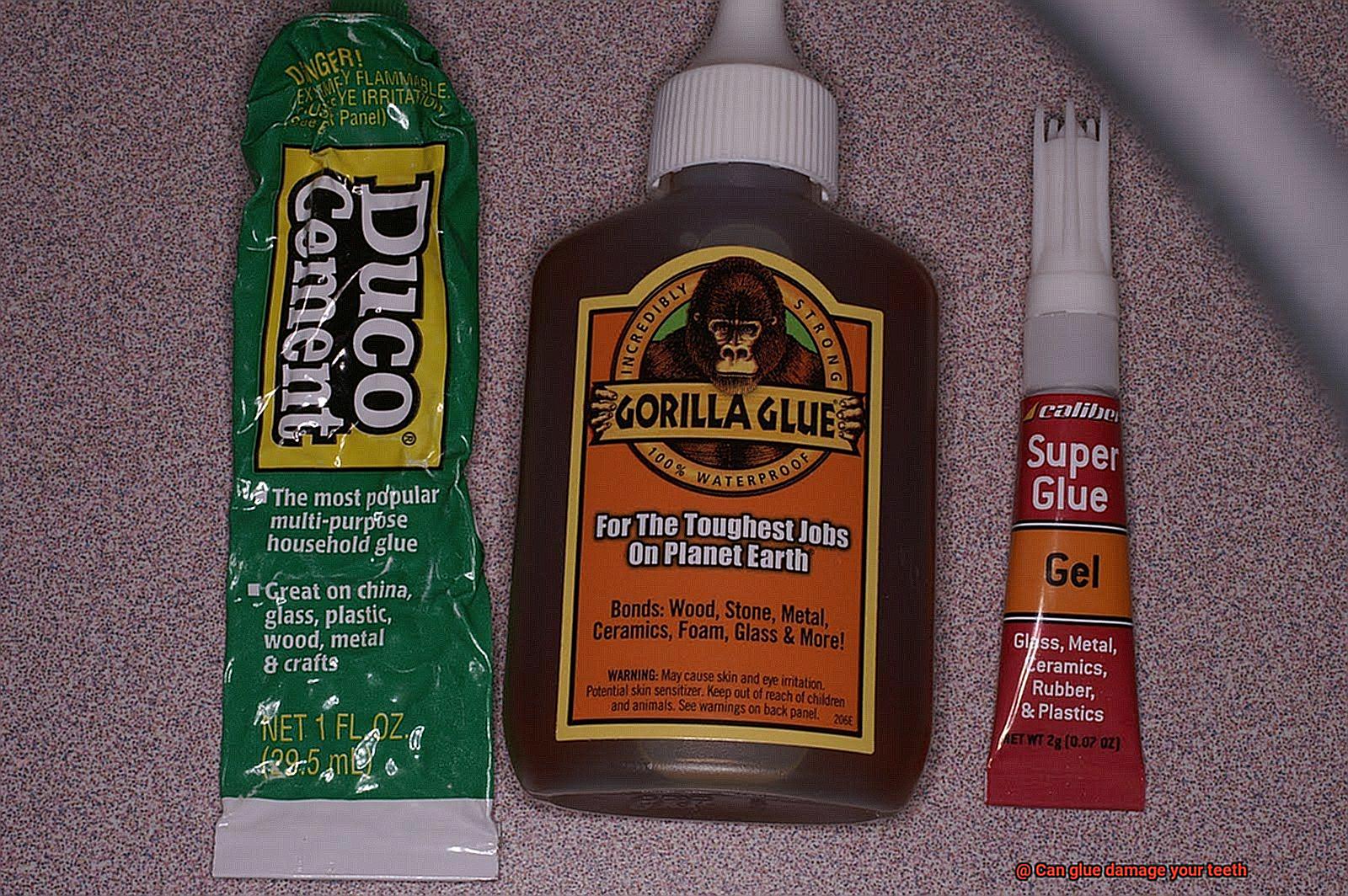
Temporary Alternatives:
- Dental Wax: A hero in disguise, dental wax or orthodontic wax is specifically formulated for oral use. It provides temporary relief by covering sharp edges or broken brackets in orthodontic appliances, ensuring your comfort until professional help arrives.
- Sugarless Chewing Gum: When in a pinch, sugarless chewing gum can come to the rescue. It helps stabilize loose dental crowns or fillings temporarily, but remember to opt for sugarless gum to avoid wreaking havoc on your teeth. This method should only be relied upon until you can see your dentist.
Seeking Professional Help:
These temporary alternatives should never replace professional dental care. They are merely stopgap measures until a dentist can address the underlying issue properly. Dentists possess the expertise, tools, and materials required to tackle dental problems effectively and safely.
Conclusion
In conclusion, using glue on your teeth can be a risky endeavor. While certain types of glue, such as school glue and dental adhesives, are generally safe for oral use, others like super glue, epoxy resin, and household glues can wreak havoc on your pearly whites and overall oral health.
Non-dental glues often harbor toxic substances that have no business near your precious teeth. These harmful compounds can unleash chemical burns, irritation, allergic reactions, enamel erosion, and even sabotage your dental work. Don’t let these glues fool you with their temporary fixes – they’re just setting you up for long-term problems.
To safeguard the integrity of your teeth and oral health, it is imperative to seek guidance from a dental professional. Dentists possess the knowledge and access to adhesives specifically formulated for dental use – ones that are both safe and effective. Let them assess your unique situation, recommend appropriate treatments, and provide expert guidance on proper maintenance for enduring results.
In dire situations where immediate professional help is out of reach, there are temporary alternatives available. Dental wax or sugarless chewing gum can offer fleeting relief until you can see a dentist. However, don’t make the mistake of thinking these substitutes can replace the care of a professional.
When it comes to your precious teeth, caution should be your guiding principle.

